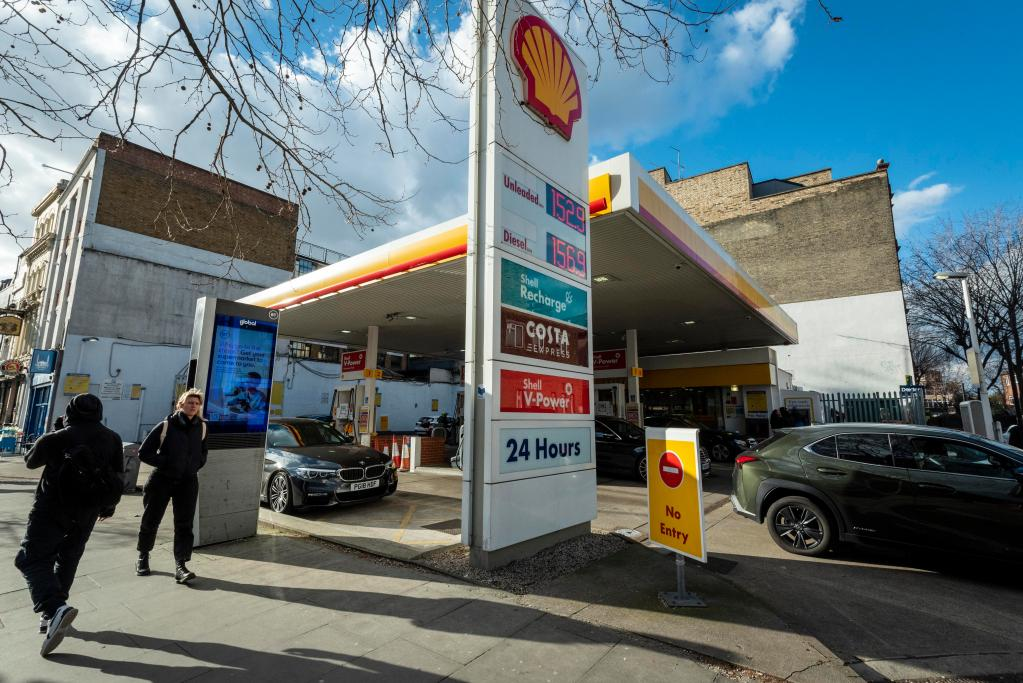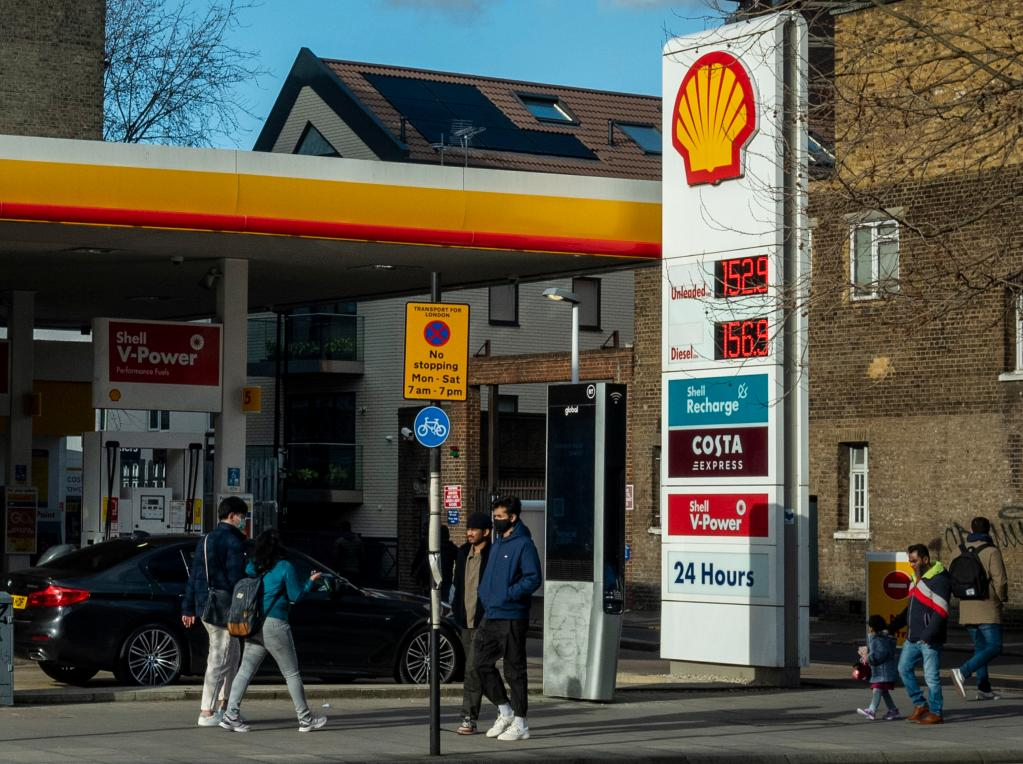
People walk past a petrol station in London, Britain, Feb. 25, 2022. After days of bearish trading amid concern over the escalating Russia-Ukraine tension, a flare-up of the conflict battered major European markets on Thursday, bringing the stocks down to new lows. (Photo by Stephen Chung/Xinhua)
LONDON, Feb. 25 (Xinhua) -- After days of bearish trading amid concern over the escalating Russia-Ukraine tension, a flare-up of the conflict battered major European markets on Thursday, bringing the stocks down to new lows.
Due to fears of supply disruption, crude oil and natural gas prices jumped to multi-year highs and were expected to plateau, if not soaring further. The spikes underpinned the outlook of higher inflation that had already dealt a blow to many households, while economists said central banks would find it difficult to contain.
TUMBLING EUROPEAN STOCKS
Amid the Russia-Ukraine conflict, turmoil swept global financial markets, triggering a massive sell-off in major European stock markets on Thursday.
The FTSE 100, the leading benchmark for Britain-listed blue-chip companies, ended the session down 3.88 percent at 7,207.01. The Paris CAC 40 plunged 3.83 percent or 259.62 points to 6,521.05. And German benchmark DAX index fell by 3.96 percent or 579.26 points to 14,052.10.
Russia-related companies listed in London were among top fallers of the FTSE 100. "With tough incoming sanctions expected, their businesses are likely to take a major hit with little respite in sight given the seriousness of the situation," said Susannah Streeter, analyst from Hargreaves Lansdown, a British financial service company.
Amid the tensions, risk aversion was higher, which explained why riskier assets, such as stocks, have been falling.
Such tensions have "outcomes that are hard to process or quantify, and in such situations investors and traders tend to sell first and ask questions later," said Chris Beauchamp, chief market analyst at the IG, an online trading provider.
Economists remained pessimistic about market developments in the near term. "Unless the situation in Ukraine improves, the global de-risking now underway will probably continue," said the Capital Economics, an economic research consultancy, in a report.
"Heightened volatility on the escalation of the conflict shows markets had not fully priced in the likelihood of deeper conflict," said Mark Haefele, chief investment officer at USB Global Wealth Management. "We expect continued volatility in the near term as leaders calibrate and announce their response to this escalation."
How major central banks respond also matters, said the Capital Economics. Noting that equities had already been under pressure amid tightening monetary policies, it added: "If the conflict prompts policymakers to hold off, or at least slow down, the tightening process, that may cushion the blow to risky assets."
FRESH HIGH ENERGY PRICES
Fears that oil supply would be disrupted sent the prices much higher on Thursday. The rally was led by Brent oil, a global benchmark, which surged above 100 U.S. dollars a barrel, a level not seen since 2014.
In 2021, Russia remained among the largest suppliers of natural gas and petroleum oils to the European Union, according to Eurostat, the statistical office of the union. And Ukraine is a key transit hub for Russian oil and gas.
"Russia's pivotal role in global energy supply cannot be downplayed and commodity markets have already started to price in the risk of disruption to Russia's energy exports to the West," said the Capital Economics in the report.
It added that if the situation escalates, oil trade would be in a range of around 120 to 140 dollars per barrel.
"Fears over supply disruptions have sent crude oil prices surging further higher," said Fawad Razaqzada, analyst from ThinkMarkets, an online broker. Meanwhile, he noted that "prices do appear severely overbought and there is a risk of a pullback in the not-too-distant future."
Gas prices also skyrocketed, with Europe's TTF gas price increasing by more than 30 percent a day. It came after German Chancellor Olaf Scholz announced on Tuesday the suspension of the certification process of the Nord Stream 2 natural gas pipeline.
"The pipeline which runs direct to Germany was projected to help ease the energy crisis in Europe. The move was seen as one of the strongest measures Europe could take against Russia," said Fiona Cincotta, market analyst from City Index, a financial services provider.
"Even if the West stops short of sanctions on Russia's energy exports, we think the risk premium in energy prices will remain high for some time yet," said the Capital Economics report.
If the situation escalates, oil prices will soar and the gas price in Europe will rise close to 180 euros (201.9 U.S. dollars) per megawatt hour, according to Capital Economics.
HIGHER INFLATION EXPECTED
"The surge in the oil price is terrible news for businesses and consumers," said Russ Mould, investment director at AJ Bell, a provider of online investment platforms and stockbroker services. Mould added that fundamentally this clarifies one of the key impacts of the Russia-Ukraine conflict: it will serve to further stoke inflation.
Noting that Western powers will have to hurt themselves if they are to hurt Russia as new sanctions are likely to affect the flow of commodities itself and possibly Russia's financial system and its access to the world, Steen Jakobsen, chief investment officer from Danish investment bank Saxo Bank, said: "This will in itself lead to much higher inflation both in the short and medium term."
"Russia exports millions of tons of oil monthly to Western destinations and vast quantities of natural gas exports. The slowing of natural gas flows over the winter has already wreaked considerable havoc, but could get worse still if flows are slowed further," Jakobsen added.
In Britain, for example, this week's surge in energy prices, if sustained, will boost the consumer price index by an extra 1.5 percentage points, said Samuel Tombs, chief British economist from the Pantheon Macroeconomics, a research consultancy.
Other factors also contributed. "Not only will energy bills keep going up, but food prices look set to jump even higher. Ukraine and Russia are both big food suppliers and any disruption to supplies will force buyers to seek alternative sources, which could jack up prices," Mould said.
As energy prices keep increasing, central banks face a major headache. "What is coming is a massive inflation shock which will force all the central banks, even the European Central Bank, to normalize monetary policy faster and more aggressively than anticipated," said Christopher Dembik, head of Macro analysis from the Saxo Bank.
Causes to inflation were complicated and there were no easy answers. For example, though interest rates were raised twice in Britain this winter, its inflation showed little sign of abating.
"How central banks respond to this new potential driver of inflation seems rather important, as the risk of significantly higher input costs from soaring commodity prices are a threat to growth and employment, but there are no good policy options in central banks' toolkits to address the challenge," said analysts from the Saxo Bank. ■

People walk past a petrol station in London, Britain, Feb. 25, 2022. After days of bearish trading amid concern over the escalating Russia-Ukraine tension, a flare-up of the conflict battered major European markets on Thursday, bringing the stocks down to new lows. (Photo by Stephen Chung/Xinhua)
